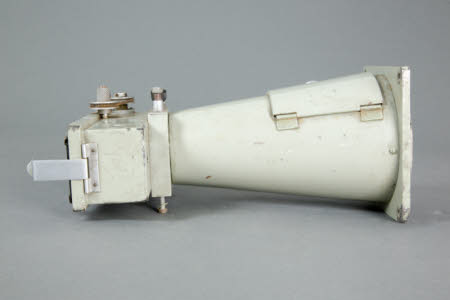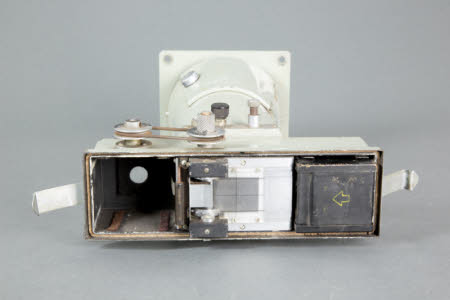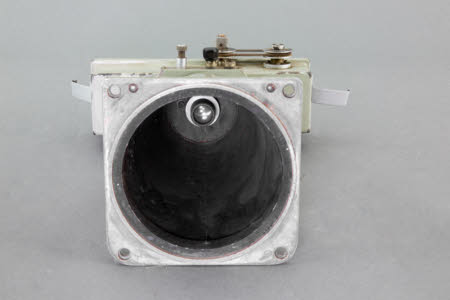Aero Recording Camera lens mount and film transport box.
Category
Photographic technology
Date
1938 - 1958
Materials
Metal, Aluminium, Plastic
Measurements
295 x 222 x 135 mm
Order this imageCollection
Fox Talbot Museum, Wiltshire
NT 1524944.1
Summary
Aero Recording Camera lens unit and film transport box. This is constructed primarily of battleship grey metal and comprises a conical mounting structure with a simple trough above containing the lens and film canisters. The conical mount has a heavy plate with four bolt holes to mount the unit to the aircraft. There is a hinged access flap with a knurled knob to open the flap. The knob can be turned but the flap appears to be sealed with bitumen. Above the conical mount is a boss containing a press button control and what appears to be two electrical contact points the screw for one of these appears to be sheared off in the boss. The opposite side of the boss has four tapped holes two of which contain bolts with anti vibration washers. These holes would line up perfectly with the holes on the Film Stop/Start end of the camera drive unit and would cause the drive shaft on the drive unit to line up with the film transport system. The film transport box is a simple trough, at each end there are spring clips which would attach the missing component (possibly just a cover). on one side of the box there is the connection to the film transport system and a white plastic label which reads " Department of Aeronautical Engineering". On the opposite side there are two pulleys connected by a spring drive belt. This transfers the movement from the film movement drive cog (which directly connects with the drive unit) to the the exposed film canister to move the film through the camera. Inside the trough in the centre is the exposure plate above the lens this comprises an aluminium plate with a plastic screen marked with crosshairs. Only one film canister is present. This would have contained the unexposed film as the arrow on the top clearly shows film transit direction and it has no connection to allow the pulleys to move the film.
Provenance
Part of the Fenton Collection. A gift from British Film Institute in 2017. From 1986-1999, part of BFI collection for the Museum of the Moving Image. BFI purchased collection in 1986 from James Fenton's Museum of Photography, Port Erin, Isle of Man 1976-1986


